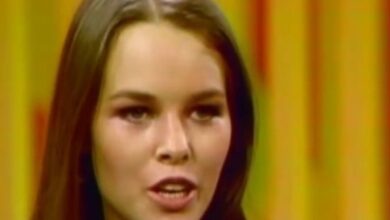Beyond the Music: Marty Robbins’ Golden Heart in “Two Little Boys”
In 1970, the Academy of Country Music honored Marty Robbins as their “Man of the Decade”—a title that reflected not only his immense musical achievements but the deep kindness that defined his life behind the scenes. One of the most powerful examples of Marty’s heart can be found in the story behind his composition, “Two Little Boys.”
The origins of the song are rooted in one of country music’s darkest chapters. In 1963, a devastating plane crash took the lives of several beloved artists, among them Patsy Cline and Hawkshaw Hawkins. The loss sent shockwaves through the entire music community, leaving countless fans and families in mourning.
For Jean Shepard, herself a celebrated country singer and Hawkshaw Hawkins’ wife, the tragedy was intensely personal. She was suddenly widowed, left to grieve the loss of her husband while caring for their young son, Don Robin Hawkins. To add to the heartbreak, Jean was pregnant with their second son, Harold Hawkins, at the time of the crash.
Marty Robbins, who was close to the Hawkins family, was deeply moved by Jean’s suffering. He watched as she tried to navigate an uncertain future, raising her boys alone while carrying the weight of her own sorrow. It was clear to Marty that words of sympathy weren’t enough—he felt called to take action that would make a genuine difference.
Inspired by empathy, Marty Robbins poured his feelings into the creation of “Two Little Boys.” The song’s lyrics read like a heartfelt monologue from a grieving widow, capturing the spirit of a mother who sees echoes of her lost husband in her two sons and holds onto the belief that he would be proud of them both.
Yet the most remarkable part of this story goes far beyond the song’s touching sentiment. In a gesture of true selflessness, Marty made the extraordinary decision not to list himself as the songwriter. Instead, he officially credited Don and Harold Hawkins—the two young sons left behind—as the song’s composers.
This unpublicized act ensured that all royalties generated by “Two Little Boys” would be funneled directly to Don and Harold, offering them crucial financial support as they grew up without their father. For Marty, it wasn’t about recognition or accolades, but about quietly supporting those who needed it most.
The story of “Two Little Boys” is more than a testament to Marty Robbins’ creative genius; it’s a shining example of his character. By giving up his own claim to the song, Marty transformed a simple melody into a lifeline for two children and a legacy of compassion within the country music world.
Through this act, Marty Robbins showed the very best of himself—not just as an artist, but as a friend, and as someone who believed that music could do more than entertain: it could heal and provide hope in the face of tragedy.
The legacy of “Two Little Boys” continues to remind fans and fellow musicians alike that real greatness is measured not just by the songs a person writes, but by the kindness and generosity they show when it matters most.
Decades later, the story remains a beloved chapter in country music history, inspiring countless others to see the human side of the stars they admire. Marty Robbins’ gift, both musical and moral, endures—proof that a truly good heart leaves its mark long after the last note fades away.





